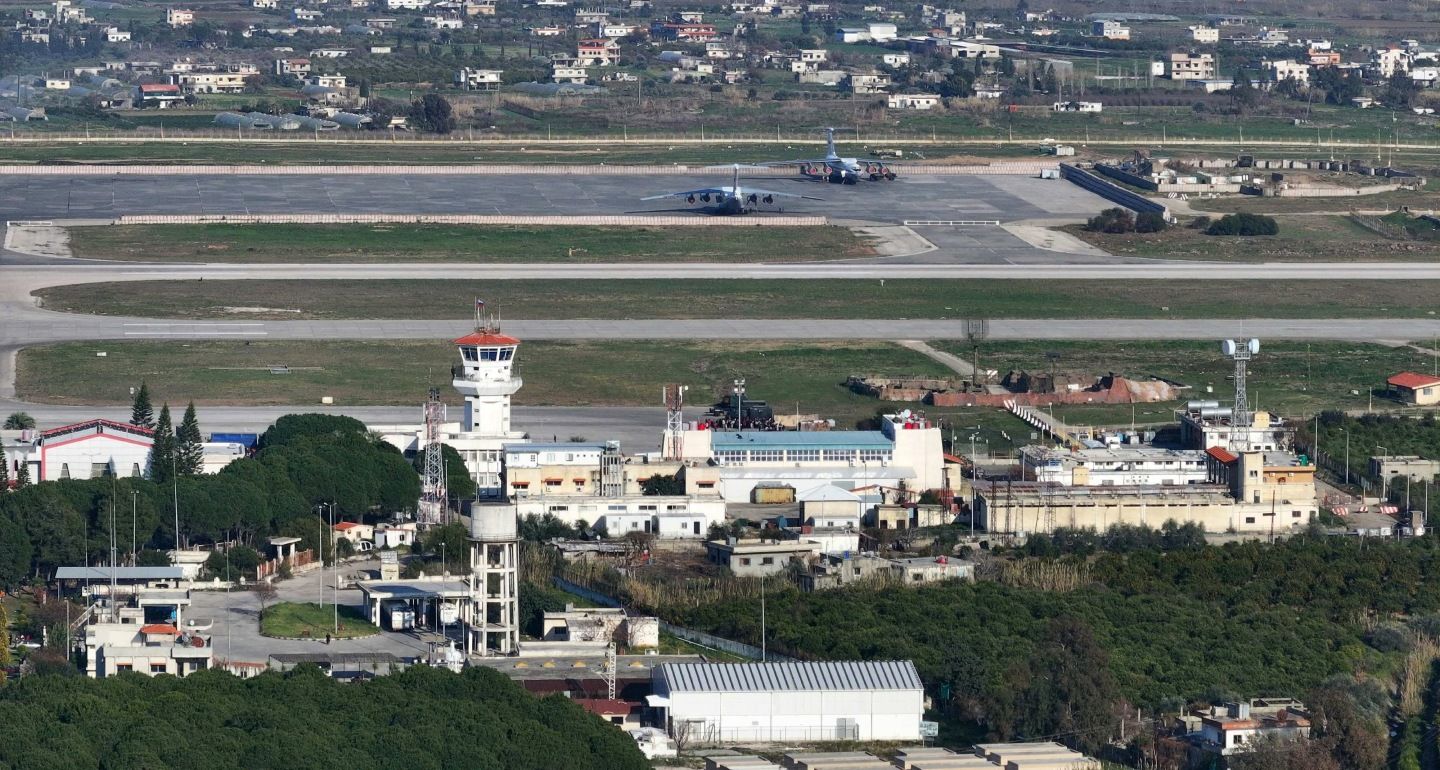What should happen when sanctions designed to weaken the Belarusian regime end up enriching and strengthening the Kremlin?
Denis Kishinevsky
{
"authors": [
"Nikita Smagin"
],
"type": "commentary",
"blog": "Carnegie Politika",
"centerAffiliationAll": "",
"centers": [
"Carnegie Endowment for International Peace",
"Carnegie Russia Eurasia Center"
],
"englishNewsletterAll": "",
"nonEnglishNewsletterAll": "",
"primaryCenter": "Carnegie Russia Eurasia Center",
"programAffiliation": "",
"programs": [],
"projects": [],
"regions": [
"Syria",
"Russia",
"Middle East"
],
"topics": [
"Security",
"Foreign Policy",
"Global Governance",
"Military"
]
}
The lifting of Western sanctions makes cooperation with Moscow even more problematic for Damascus, since Russia itself remains heavily sanctioned.
The new Syrian authorities are rapidly moving toward international recognition, and not just among their regional neighbors. Keen to limit the influence in Syria of the previous regime’s allies Iran and Russia, even the United States and the European Union have lifted most of the sanctions earlier imposed on Damascus.
The normalization of relations with the West could cancel out the remaining arguments in favor of cooperation with Moscow for new Syrian leader Ahmad al-Sharaa and his entourage. The growing number of incidents at its military bases indicates that Russia is already being gradually squeezed out of Syria.
It was clear from the very beginning that the Islamist al-Sharaa, who overthrew Bashar al-Assad, would not be an international pariah. Turkey played a huge role in the formation of the Hayat Tahrir al-Sham movement that took power, and after its victory Ankara predictably started actively establishing cooperation with the new leaders in Damascus. By the summer of 2025, yesterday’s Islamic militants counted dozens of countries as their international partners, from Middle Eastern monarchies to the United States and the European Union.
Al-Sharaa’s chief supporters are the Persian Gulf monarchies. Riyadh and Doha have already paid off Damascus’s $15 million debt to the World Bank, paving the way for the possibility of new loans. They have also said they are ready to pay the salaries of Syrian civil servants, which could result in Syria becoming partly dependent on the Gulf monarchies.
By the beginning of spring, the EU had suspended some sanctions, and in March, Germany reopened its embassy in Syria after a thirteen-year absence.
The real breakthrough for the new Syrian government, however, was U.S. President Donald Trump’s tour of the Middle East, during which he met with al-Sharaa in Saudi Arabia. Trump not only shook hands with a man who until recently had a $10 million U.S. bounty on his head, but also announced his intention to lift sanctions against Damascus. The EU soon followed his example, and most Western sanctions against Syria were removed in May.
Despite having propped up the Assad regime for many years, Moscow was among the first to establish contact with the Syrian militants once that regime collapsed. This approach is driven by pragmatic interests. First and foremost, the Kremlin has a vested interest in keeping its Khmeimim air base and the naval hub in Tartus, since they play a key role in Russian logistics throughout the Middle East and Africa. Russia’s presence in Syria is also important within a broader context for potential bargaining with the United States or as leverage in relations with Turkey and Israel, not to mention Russia’s overall authority in the Middle East.
At first, the new Syrian authorities were also reluctant to sever relations with Moscow, even though it had given refuge to al-Assad after he fled the country. They gave initial security guarantees for Russia’s military bases, and al-Sharaa himself spoke about the importance of the partnership with Russia. Having seized power by force, Syria’s new rulers were wary of throwing away any international contacts—especially with Russia, which, if it so desired, could try to sabotage the establishment of the new regime in Damascus.
Even at an early stage, however, the Syrian authorities made it clear that they still had grievances against Moscow. They called on Russia to “heed the mistakes of the past” and hinted at the need for compensation.
The first test of the renewed Russian-Syrian relations came in March, when Damascus suppressed the Alawite uprisings in Latakia. Although Moscow did allow some locals into its bases, it did not openly interfere in the developments, and its reaction was generally acceptable to al-Sharaa.
However, now that the Syrian authorities no longer lack international recognition, Moscow’s potential value for Damascus has decreased. Today, Syria’s main sponsors are the Gulf countries and Turkey, while Russia stopped sending food supplies immediately after al-Assad’s fall.
The lifting of Western sanctions makes cooperation with Moscow even more problematic for Damascus, since Russia itself remains heavily sanctioned. Syria effectively needs to choose whether to cooperate with Moscow or the West, and it is quite clear that Russia is currently unable to compete with Western countries as a source of aid for reconstruction and investment.
Last but certainly not least, there is little love lost between members of Hayat Tahrir al-Sham themselves, who form the backbone of the new government, and Moscow. Russian aircraft bombed the militants for years, and in 2015 it was Russia’s intervention that extended al-Assad’s rule for another decade. Accordingly, the majority of the Syrian leadership would be only too happy to see Russia wind up its presence in the country. It’s merely a question of how quickly it can be forced out, and what the cost will be.
The Syrian authorities are already gradually curtailing their interaction with Russia. At the start of 2025, Damascus canceled a management contract for the port of Tartus that had been signed with Moscow back in 2019. In May, Syria found a replacement: Dubai Ports World, which agreed to invest $800 million in the facility.
Another recent example is Syria’s decision to stop printing its national currency in Russia. As soon as it was announced that sanctions would be lifted, Damascus promptly made arrangements to print its money in Germany and the UAE.
It’s a similar story with the Syrian infrastructure projects in which Russian businesses were involved. Back in the winter, the new authorities held an opening ceremony for a water treatment plant in Latakia that had been built by the Russian company Vodstroi under the previous government. That government had not yet paid for it, and given the current situation, the new one clearly does not intend to do so. There are many more such examples, but the Russian side, for image reasons, prefers not to make them public.
Moscow can forget about its investments in local infrastructure and various projects involving Russian companies. Not only will they not be seeing any returns; al-Sharaa willmost likely ask the Kremlin for compensation again .
A similar fate awaits trade between Moscow and Damascus. In March, Russia resumed deliveries of oil to Syria, followed by grain in April. The Syrian authorities still need those supplies, which is why they agreed to their resumption. However, that is unlikely to last long: Syria is due to be imminently reconnected to the SWIFT international payment system, to which Russia does not have access. It’s unlikely that Damascus will deem that gray schemes to import Russian goods are worth risking Syria’s reintegration into the global financial system.
The biggest tensions, however, are over the fate of the Russian bases. At the same time as news broke about the lifting of Western sanctions, there were reports that the Syrian authorities had tightened security checks of military personnel entering and leaving Russian facilities. At the end of May, the Khmeimim base was attacked, resulting in at least two fatalities on the Russian side. The Syrian authorities claim it was a “personal initiative” by several militants.
It is possible that the Syrian authorities will adopt the tactics of pro-Iranian forces that have carried out drone and missile strikes against U.S. facilities in Syria and Iraq to try to get the United States to leave the region. Drones have been shot down over Russian military bases in Syria on multiple occasions this year. The fatal attack on Khmeimim may not be the last.
Al-Sharaa has shown himself to be a pragmatic leader, so there is no reason to expect Damascus to exhibit excessive haste in ending its cooperation with Russia. But it will be increasingly difficult for Moscow to maintain its presence in Syria.
Carnegie does not take institutional positions on public policy issues; the views represented herein are those of the author(s) and do not necessarily reflect the views of Carnegie, its staff, or its trustees.
What should happen when sanctions designed to weaken the Belarusian regime end up enriching and strengthening the Kremlin?

Denis Kishinevsky
The supposed threats from China and Russia pose far less of a danger to both Greenland and the Arctic than the prospect of an unscrupulous takeover of the island.

Andrei Dagaev
Western negotiators often believe territory is just a bargaining chip when it comes to peace in Ukraine, but Putin is obsessed with empire-building.

Andrey Pertsev
Unexpectedly, Trump’s America appears to have replaced Putin’s Russia’s as the world’s biggest disruptor.

Alexander Baunov
Baku may allow radical nationalists to publicly discuss “reunification” with Azeri Iranians, but the president and key officials prefer not to comment publicly on the protests in Iran.

Bashir Kitachaev